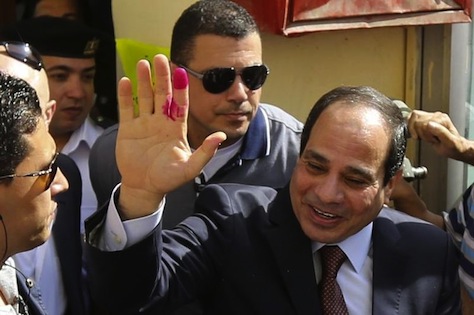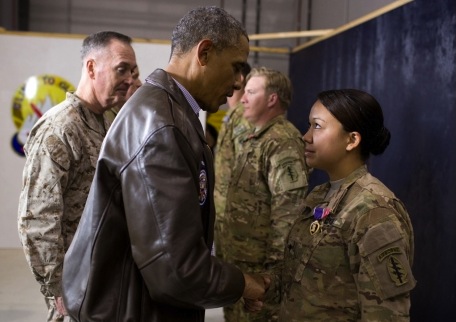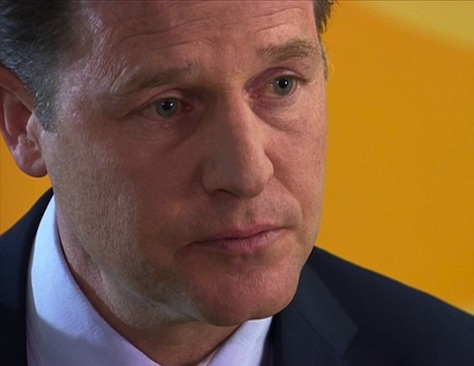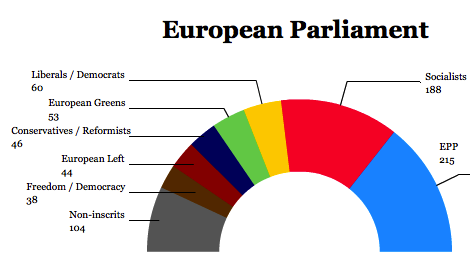UPDATE: As it turns out, turnout amounted to just 7.5% in the first two days of voting on Monday and Tuesday. No wonder authorities wanted to keep polls open today — at this rate, they might want to consider opening voting through the whole week. But the high apathy indicates just how uncompetitive this election is — and quite possibly how apathetic Egyptians are about el-Sisi’s soft authoritarianism and his promises to bring austerity economics in a bid to jumpstart Egypt’s private sector.
* * * * *
Now here’s a measure for increasing voter turnout that I’ll bet the European Union’s leaders never considered:![]()
Amid disappointing turnout during the first and second days of the presidential elections, a judicial source has said the High Elections Committee decided to extend the presidential elections for a third day until Wednesday, with voting to last until 9pm on Tuesday.
The High Elections Committee said the elections were extended for another day due to the heat wave, the increasing demand in the evening and the difficulty to extend the voting hours until late at night.
If you don’t like the turnout, just keep the polls open until you do.
Furthermore, Egypt’s military-led government is harassing Egyptians to vote and threatening non-voters with fines of around $72. Interim president Adly Mansour encouraged Egyptians to ‘impress the world’ with a large turnout, and his government proclaimed Tuesday a public holiday, closing banks and other official offices.
If you’re surprised at what seems like a ridiculous aberration for a fair election, don’t be — the ‘election’ is more of a coronation than a truly competitive contest.
The wide frontrunner in the race is Abdel Fattah el-Sisi (pictured above), until late March the army chief of staff and defense minister of the country. It was his decision in July 2013 to overthrow Mohammed Morsi, Egypt’s first directly elected president in a free and fair election. Though Morsi’s government had tried to pull the country in a more Islamist direction, and though mainstream and secular Egyptians gathered in the millions throughout June and early July 2013 protesting its excesses, el-Sisi’s military regime spent the rest of the year cracking down on the Muslim Brotherhood (الإخوان المسلمون), which it designated a ‘terrorist group,’ and just about anyone else who criticized military rule too loudly, including journalists.
In the months leading to el-Sisi’s resignation from the military, he waged an all-but-in-name shadow campaign for the Egyptian presidency, with the apparent backing of the Egyptian military elite.
* * * * *
RELATED: The official unofficial el-Sisi
presidential candidacy continues in Egypt
* * * * *
El-Sisi faces secular leftist Hamdeen Sabahi, who narrowly finished in third place in the first round of the May 2012 presidential election. El-Sisi, who has become genuinely popular in his quest to crack down on the Muslim Brotherhood and in his efforts to stabilize Egypt, is expected to win by a wide margin. Many of Egypt’s top political movements, including the Tamarod (تـمـرد) protest movement that opposed Morsi, former Arab League secretary-general Amr Moussa and his supporters, many of Egypt’s most established secular liberal parties, and even many Salafists, who are technically even more conservative than the Muslim Brotherhood, are backing el-Sisi’s candidacy.
* * * * *
RELATED: How Egypt’s El-Sisi out-Nassered (and out-Sabahi’ed) Sabahi
* * * * *
When the military government held a referendum in January (Egypt’s third since the fall of former president Hosni Mubarak in February 2011) on amending the constitution, Egyptian voters approved it by a margin of 98.13% to 1.87%. In that election, the turnout was just 38.6% — still higher than the turnout of 32.9% for the equally forced constitutional referendum Morsi held in December 2012 to introduce a new constitution. Continue reading Voting will continue until the morale (and turnout) improves




